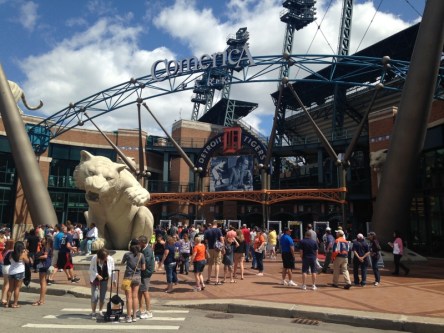Ed. note: The third in a three-part series, our final article on the real estate realities for Detroit, Michigan, as the city emerges from a long period of decline. Read the first installments here (Part 1) and here (Part 2). Walking around downtown Detroit, at many times of day, feels like one has wandered onto a deserted movie set. Historic skyscrapers loom overhead. There are hints of change and progress: work on a new rail line, construction fences around old buildings, for rent signs in windows. What you don’t see, that feels strangest of all, are very many people. At 8 a.m. and 5 p.m., there is foot traffic as employees walk to or from their jobs. A great many of them are wearing Quicken Loan employee ID badges, identifying them as part of Dan Gilbert’s empire. Gilbert’s investment in the city, from real estate purchases – more than 50 buildings to date – in addition to centering Quicken’s headquarters downtown and funding a large portion of the M:1 RAIL line, is ubiquitous. “Dan Gilbert obviously is leading the charge in downtown real estate reinvestment. He’s acquired 52 properties in the last couple of years, for Quicken and various subsidiary companies of his own,” said John Latessa, Senior Managing Director of CBRE’s Michigan operations. The other major property accumulator, the Caesars Pizza-founding, sports team-owning Ilitch family, has been buying up lots and decaying buildings for a new hockey stadium for years. “(Gilbert and the Ilitches) are generating the interest that didn’t exist before. If they weren’t doing this stuff and couldn’t do it on their own, a lot of these other projects wouldn’t be possible,” said Scott Allen, president of Fourmidable, a Detroit-based multifamily property management firm. Rising rents for multifamily Detroit’s real estate...

